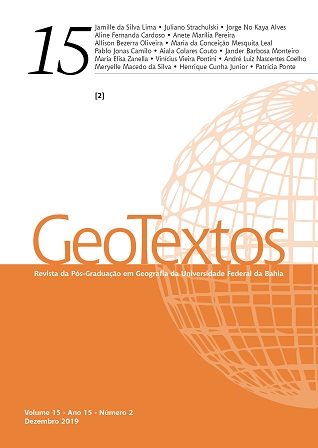USE OF RAPID EVALUATION PROTOCOL IN THE ENVIRONMENTAL DIAGNOSIS OF FLUVIAL SYSTEMS: CASE STUDY IN URBAN AREAS OF ICONHA AND PIÚMA (ES)
DOI:
https://doi.org/10.9771/geo.v15i2.32409Keywords:
Novo River Drainage Basin, Rapid Evaluation Record, Iconha (ES), Piúma (ES)Abstract
Drainage basins are examples of spatial arrengements that integrate a joint vision of the behavior of natural conditions and human activities within them, where urbanization and its materializations are highlighted, which often have negative consequences in the fluvial systems. Nowadays, the development of rapid and simple tools to accomplish the preliminary environmental diagnosis of such systems has been conquering space against monitoring stations, like the Rapid Evaluation Records (Protocolos de Avaliação Rápida – PARs). Thus, this study discuss the potentialities of applying a PAR model in urban areas of the municipalities of Iconha and Piúma (ES), in the context of the Novo River Drainage Basin. The results show that in four out of five analyzed points, the environmental quality was classified as “intermediate”, while in the remaining one it was “good”. The use of the PAR model was generally satisfactory, exposing the advantages of its use to designate the environmental quality of the analyzed rivers.Downloads
Downloads
Published
How to Cite
Issue
Section
License
Autores que publicam nesta revista concordam com os seguintes termos:
Autores mantém os direitos autorais e concedem à revista o direito de primeira publicação, com o artigo simultaneamente licenciado sob a Licença Creative Commons Creative Commons CC BY que permite o compartilhamento do trabalho com reconhecimento da autoria e publicação inicial nesta revista. Esta licença permite que outros distribuam, remixem, adaptem e criem a partir do seu trabalho, mesmo para fins comerciais, desde que lhe atribuam o devido crédito pela criação original. É a licença mais flexível de todas as licenças disponíveis. É recomendada para maximizar a disseminação e uso dos materiais licenciados. Ver o resumo da licença em: https://creativecommons.org/licenses/by/4.0/ Ver o texto legal da licença em: https://creativecommons.org/licenses/by/4.0/ Consulte o site do Creative Commons: https://creativecommons.org/licenses/?lang=pt
Autores têm autorização para assumir contratos adicionais separadamente, para distribuição não-exclusiva da versão do trabalho publicada nesta revista (ex.: publicar em repositório institucional ou como capítulo de livro), com reconhecimento de autoria e publicação inicial nesta revista.
Autores têm permissão e são estimulados a publicar e distribuir seu trabalho online (ex.: em repositórios institucionais ou na sua página pessoal) a qualquer ponto antes ou durante o processo editorial, já que isso pode gerar alterações produtivas, bem como aumentar o impacto e a citação do trabalho publicado (Veja O Efeito do Acesso Livre).






